- Home
- Margaret Brownley
Four Weddings and a Kiss Page 10
Four Weddings and a Kiss Read online
Page 10
Wonderful? All Jack Ludgrove had done was introduce himself to the community and to the subscribers of the newspaper. Nothing wonderful about it. Informative and competent at most.
Ada said, “I didn’t expect him to be so handsome. You’d never guess he’s as old as he is.”
Old? They must think the same of Molly.
“Mother says he would do quite nicely as a husband for one of us,” Jane preened. “I wouldn’t object.”
Molly felt a desperate need to escape. She gestured with her basket. “I really must pay for these and return home. Please excuse me.”
The sisters didn’t take the hint. They followed her to the counter where the proprietor, Ethan Cook, waited near the cash register.
“What is it like to work with him, Miss Everton?” Ada asked.
Molly felt her jaw tighten. “The same as with any editor.” She sent a pointed look in Mr. Cook’s direction.
“Is this everything?” he asked.
She nodded. And please hurry!
Jane leaned in close to Molly. “He’ll come to the barn dance, won’t he?”
“I haven’t any idea. Maybe no one has told him about it.”
“Then we’ll tell him. Won’t we, Ada? Let’s go to the Sentinel right now.” The sisters turned in unison and hurried away.
Molly let them go, though she could have saved them the effort. The newspaper office would be closed by now.
Intruding on her thoughts, Mr. Cook gave her the total for her grocery purchases. She paid him, then bid him a good day and started for home. She didn’t hurry. Nothing in the basket was required for supper. Besides, it was too hot. She kept to the shade as much as possible, but as she left the heart of Killdeer, there was an absence of trees and buildings. It wasn’t long before trickles of sweat were meandering down her spine. Her forehead grew damp as well, although her straw bonnet protected her face from the sun.
She was thinking about a cool glass of lemonade when she glanced up and saw Jack Ludgrove riding toward her. He waved and she came to a standstill. Not that she wanted to speak to him. Her feet seemed to stop of their own accord.
“Good day, Miss Everton,” he said as he reined in his horse.
“Good day.”
“I wanted to tell you again what a fine column that was on theater fire safety.”
“Thank you,” Molly replied, though she tried not to let him see how much his words pleased her.
“I didn’t see you in the office this morning.”
“Didn’t Father tell you? I don’t come to the paper on Friday mornings.”
“Hmm. Maybe he did tell me.” Unexpectedly, he dismounted. “Allow me to carry that basket for you, Miss Everton.”
“It’s not necessary. It isn’t all that heavy, and I haven’t far to go now.”
He smiled as he took hold of the handle. “Perhaps not, but we wouldn’t want you to get overheated. The sun is quite relentless today.”
Molly tightened her grip for a few moments, then let go. He was right. It was hot. Too hot to argue with him. Easier to let go and get home as soon as possible.
Carrying the basket in his left hand and leading the horse with his right, Jack fell into step beside her, matching his stride to hers. His nearness made Molly uncomfortable. Perhaps that was why she said the first thing that popped into her head.
“Are you planning to go to the barn dance at the Holbrook farm?”
“Barn dance?” His brows drew together in a thoughtful frown. “Oh, yes. I read something about it in an earlier edition of the paper. Next week, isn’t it? I guess I hadn’t thought about it. I suppose most folks from around here will be there.”
“Most, yes.”
“Then I really ought to go too.” The slightest of smiles curved the corners of his mouth as he looked at her. “You’ll be there, of course. Wouldn’t want to go and not get to dance with you, Miss Everton.”
A strange sensation coiled in her belly. “I’ll be there,” she answered softly. Then she quickened her pace, afraid the heat was affecting her ability to make sense of things.
Again, Jack adjusted his pace to hers, but he didn’t try to continue the conversation. He seemed satisfied with the silence. When they reached the front gate to the Everton home, he opened it before her, then offered her the shopping basket.
She took it with a “Thank you, Mr. Ludgrove.”
“Delighted, Miss Everton.” He tipped his hat. “I look forward to Sunday.”
Sunday. She’d forgotten. Her mother had invited Jack Ludgrove to Sunday dinner. And Jack must have accepted.
After a quick nod, she walked up the stone walk to the front porch, trying not to appear as if she was fleeing his presence—although she feared that might be exactly what she was doing.
CHAPTER SIX
ALTHOUGH BERTHA SIMPSON’S MEALS AT THE BOARDINGHOUSE were more than adequate, Jack decided to eat breakfast the next morning at Florence’s Restaurant. It made sense, as editor of the paper, for him to become better acquainted with the business owners in Killdeer. They would be his advertisers from here on out. Without them, the paper would fail.
He’d heard several times from different sources that Florence Perkins made the best pies west of the Mississippi, but he would have to discover the truth of it for himself another time. Pie was not on the breakfast menu. When the waitress came, he ordered coffee, bacon, and a stack of flapjacks. Then he leaned back in his chair and looked around the room. Two men sat at the table nearest the window. A young woman and school-age boy sat near the far wall.
The front door opened and a man about Jack’s age entered the restaurant. A man he hadn’t met over the course of the past week. His suit proclaimed him a businessman. The wire-rimmed glasses perched on his nose made him look studious. Doctor? Teacher? Lawyer? Most likely one of those professions.
The man in question saw Jack looking at him. He removed his hat and approached Jack’s table. “You must be Mr. Ludgrove, the new editor of the paper.” He offered his hand. “I’m Stedman Jones. Attorney-at-law.”
Ah, a lawyer, as suspected. “How do you do?” Jack shook the proffered hand.
“I was out of town on business when you arrived. Just got back on yesterday’s stage. Would you mind if I joined you?”
Jack motioned to the other chair at his table. “Not at all. Please.”
“Thank you. Most kind of you.” Stedman hung his hat on a spindle on the back of the chair, then sat. “How have you found our fair town? Must be quite different from Des Moines.”
“I like it here. People are friendly. And the mountains are spectacular.”
Stedman leaned forward and lowered his voice a little. “And how are you getting along with Miss Everton?” One corner of his mouth curved upward. He looked pleased with himself.
The question and smirk irritated Jack.
“I ask because Molly Everton isn’t one to keep her opinions to herself. Don’t suppose that makes it easy to be her boss.”
“I like people who speak their minds. Men or women.”
Stedman chuckled as he leaned back. “Then you should get along with Miss Everton quite well.” His gaze shifted to the waitress who was walking to the table with Jack’s cup of coffee.
The conversation paused while the lawyer gave his breakfast order to the waitress. The lull allowed Jack to wonder about the annoyance he’d felt when Stedman Jones asked about Molly, even before he’d made the comment about her opinions.
“And hurry with that coffee, please,” Stedman said as the waitress walked away. Then he looked at Jack again. “Have you eaten here before?”
“Today’s my first time.”
“You’re staying at the boardinghouse, I heard.”
“Yes.”
“Well, you won’t starve to death. I know. I lived there myself when I first came to Killdeer. Mrs. Simpson serves generous portions at every meal. But Mrs. Perkins is by far the better cook. Eat at this restaurant when you can.” Stedman grinned. “’Course,
now that I’m married, I don’t come often.”
So why are you here now? Trouble with the wife?
The lawyer chuckled, as if Jack had asked his questions aloud. “The missus and I were in Denver. I had business with other attorneys, and my wife and I were staying with family. Violet—that’s my wife’s name—stayed on with her parents for a few more weeks. We’ll have you over for supper when she gets back.”
“Very kind of you, Mr. Jones.”
“Not at all. I remember what it was like to be new in town, without any friends or family.”
Jack wondered how much work a lawyer could find in a small town like Killdeer, but he decided not to ask.
The waitress arrived with a tray and set a plate of food before each of them. After she left, Jack closed his eyes and said a silent blessing. When he opened his eyes again, Stedman was about to take his first bite of scrambled eggs. Silence ruled the table for a short while. But Stedman Jones—Jack had already learned—was not someone who let conversation die for long.
“Roland runs an excellent paper. Lots of news to help his readers stay informed.” Stedman took a sip of coffee. “Good man. I respect him a lot.”
Jack nodded.
“I called on his daughter for a while a few years back.”
“Molly?”
Stedman grinned again. “Only daughter he’s got.”
Jack wondered what had happened to the courtship.
“I quickly learned she and I weren’t destined for each other.” He shook his head. “Not at all. I’m now convinced higher education isn’t a good thing for women. It fills their heads with too many ideas. Ideas that make them forget their proper place.”
Jack’s annoyance returned. He was beginning to dislike this friendly, too talkative lawyer.
“You know what I mean?” the other man added.
“Yes, I know what you mean.” And I think you’re dead wrong.
Jack hurried to finish his breakfast, wanting to be on his way. After the last bite, he bid Stedman Jones good-bye, paid for his breakfast, and left the restaurant. Out on the boardwalk, he paused a moment and drew in a deep breath. The flapjacks felt like lead in his belly, but not because there’d been anything wrong with them. No, it was the company who had turned his stomach sour.
Jack and Stedman were not destined to become the best of friends.
Molly held the timepiece in the palm of her left hand. “It’s exactly what I wanted, Mr. Ingram. Thank you.” She glanced up at the watchmaker. “You will keep it a secret. I want Father to be surprised on his birthday.”
“Won’t breathe a word of it, Miss Everton.”
The shop door opened behind Molly, but she didn’t turn around. Her gaze had returned to the pocket watch in her hand. The front of the gold watch was engraved with a locomotive. On the inside, the white dial had large black Roman numerals, and the time was marked by black minute and second hands. It would be easy for her father to read, perhaps even without his spectacles.
“Good morning, Miss Everton.”
Her heart jumped at the sound of Jack speaking her name. She closed her hand around the watch as she turned to look at him. “Mr. Ludgrove.”
“An unexpected pleasure.”
Heavens! Was she blushing? Her cheeks felt unusually warm as she turned back to William Ingram. “If you’ll put it in a box, I’ll take it with me.”
“Of course.” The watchmaker took the pocket watch from her and went into the back room.
“For your father?” Jack asked.
He’d seen the watch. He couldn’t help but see it, she supposed. “Yes. For his birthday. Please don’t say anything to him. I want him to be surprised.”
“Your secret is safe with me, Miss Everton.” He smiled.
Something about that smile made the moment feel special, intimate. Not wise. Not what she wanted. He wasn’t her friend. He was her boss. A boss she hoped would leave Killdeer, sooner rather than later. She needed to make him want to go.
“I had breakfast this morning at the restaurant. On my way out, I remembered what you said about Mr. Ingram.” Jack pulled a watch from his pocket. “Mine’s been losing time. A little each day. Thought I’d see if Mr. Ingram could repair it.”
“I’m sure he can.”
“I met Mr. Jones at breakfast. Rather loquacious, isn’t he?”
Molly felt the expression freeze on her face. Stedman Jones. One of her failures. The most recent and the last. When their brief courtship had ended, she’d sworn never to go through such an experience again.
But Jack was right. Stedman was loquacious. A less polite term would be gossip. Stedman kept quiet about his clients and their legal concerns, but he was plenty free with words about anything or anyone else. Undoubtedly he had said something to Jack about her. Something less than complimentary. And Molly hated being gossiped about more than anything. Thinking about it made her eyes smart.
“Here you are, Miss Everton.” Mr. Ingram returned to the counter and handed her the small box.
She opened her reticule and withdrew the money to pay for the watch.
“Miss Everton?” Jack said.
She looked at him.
“May I ask, when is your father’s birthday?”
“Tomorrow.”
“Ah. Then it is fortuitous that I ran into you. I wouldn’t want to be the only one to come without a gift.”
Gracious! She’d forgotten again. He was coming to Sunday dinner. And Father, who’d issued Mother’s invitation, hadn’t told Jack that they would be celebrating his birthday. Father would have left out that part on purpose, no doubt.
“You needn’t feel obliged to bring a gift. Father wouldn’t want you to.”
“I know. But I’d like to bring something all the same.”
It wasn’t fair. She wanted to dislike Jack Ludgrove. She wanted to dislike him a lot. But he was so naturally likable.
It simply wasn’t fair.
CHAPTER SEVEN
JACK WOULD HAVE BEEN THE ONLY DINNER GUEST ON Sunday who came without a gift for the host. He thanked God he’d learned of the occasion in time to bring something. Roland Everton seemed extremely pleased with the book Jack gave him—a history of the Roman Empire.
Molly, who was seated on Jack’s left, leaned close and whispered, “How did you know?”
“Know what?”
“Father’s interest in the Roman Empire. Did he tell you?”
Jack turned to look at her. “No. I bought the book before coming to Wyoming.”
She drew back from him, chin held high.
“It’s still new. Haven’t had time to read or leaf through it even. I just thought it would make a nice gift, and since I only found out yesterday about your father’s birthday, I—”
“You’re interested in the same thing Father is?” Her gaze and voice were filled with skepticism. “About the Roman Empire?”
“Among other things, yes. History has been a passion of mine since I was a boy. Any history, really, but I have a special fascination for ancient Rome and Egypt.”
“Hmm.”
Perhaps he should have been insulted by her disbelief. It was almost the same as calling him a liar. But he wasn’t insulted. He was amused. Molly Everton had that affect on him more often than not.
Her eyes narrowed. Her mouth thinned. Then a slow smile curved her lips. “Tell me, Mr. Ludgrove. According to Gaius Suetonius Tranquillus, who were the twelve Caesars?” She might as well have slapped him with a glove and challenged him to a duel. Subtle she was not.
Jack couldn’t help it. He laughed aloud.
Everyone at the table turned to look at him. Or rather, at the two of them.
“Does that mean you cannot name the twelve Caesars?” Molly asked, triumph in her voice.
Still grinning, he answered, “It does not. I suppose you want them in order. The first, of course, was Julius Caesar. The rest were the eleven emperors who followed after him.” He touched the index finger of his left hand and began to
count them off. “Augustus, Tiberius, Caligula. Next came Claudius and Nero. Then Galba and . . . and . . . oh yes, Otho. Then Vitellius, Vespasian, Titus, and finally Domitian. I believe I got them all right.”
From the head of the table, Roland said, “You did, indeed, Mr. Ludgrove. Well done.” Then he applauded and the others followed suit.
Everyone except Molly.
Jack considered asking if she could name all the female rulers of the British Empire from the time of the Norman conquest, but he decided to do so would be less than gracious. It would be tweaking her nose for sport, and he didn’t want to be unkind. He liked Molly Everton, perhaps more than he should.
Ruth Everton must have sensed they were wading in dangerous waters, for she chose that moment to rise from her chair at the end of the table. “Please, everyone. Let’s go into the front parlor. Reverend Lynch, did you bring your violin?”
“Yes, I did.”
“Then you and Molly can play for us.” Ruth looked at Jack. “Molly is an accomplished pianist.”
“Indeed? I look forward to listening.” Jack stood and stepped behind Molly’s chair to pull it out from the table. Though he couldn’t see her face, the back of her neck told him she was blushing.
After she rose, she faced him and in a low voice said, “Mother exaggerates. It’s something she does whenever—” She broke off abruptly, then hurried out of the dining room.
Whenever what? Jack would have paid good money for the answer.
He moved with the rest of the party into the parlor. While others found places to sit, Jack chose to stand to one side of the doorway, leaning a shoulder against the wall. A good place from which to observe the assemblage—especially Molly.
The lilac-colored gown she wore was pretty and looked to be of the latest fashion, although he wasn’t the sort of man who kept up with such things. He was used to seeing her in simpler attire—a dark skirt and a tailored white blouse. Sometimes she added a vest. No one had to tell him Molly was more comfortable in her usual day wear.
She sat on the piano bench, waiting while the reverend readied his violin. Then, after a brief exchange of words too soft for Jack to hear from where he stood, they began to play.

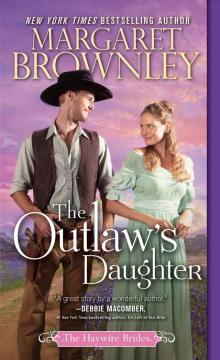 The Outlaw's Daughter
The Outlaw's Daughter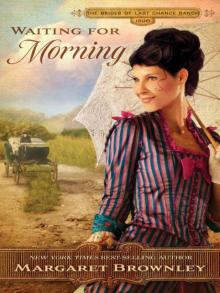 Waiting for Morning (The Brides Of Last Chance Ranch Series)
Waiting for Morning (The Brides Of Last Chance Ranch Series) Do You Hear What I Hear?
Do You Hear What I Hear? The 12 Brides of Summer Novella Collection #3
The 12 Brides of Summer Novella Collection #3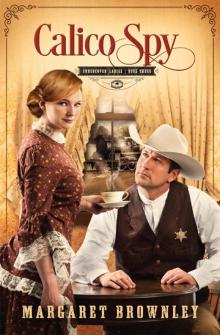 Calico Spy
Calico Spy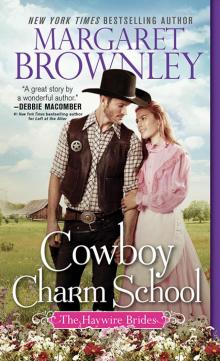 Cowboy Charm School
Cowboy Charm School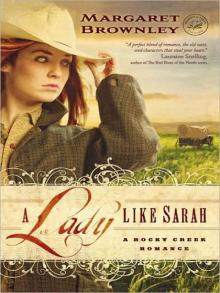 A Lady Like Sarah
A Lady Like Sarah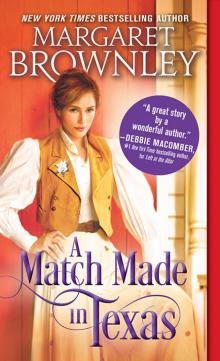 A Match Made in Texas
A Match Made in Texas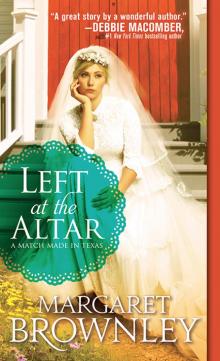 Left at the Altar
Left at the Altar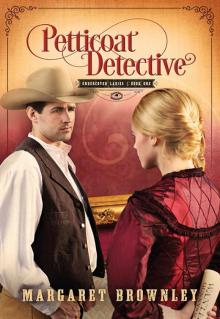 Petticoat Detective
Petticoat Detective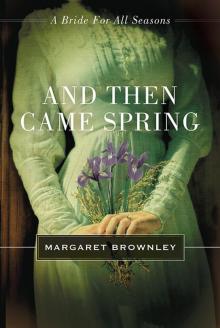 And Then Came Spring
And Then Came Spring Log Cabin Christmas
Log Cabin Christmas Four Weddings and a Kiss
Four Weddings and a Kiss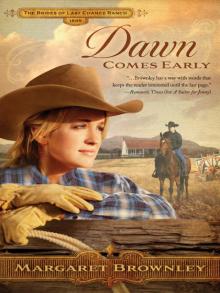 Dawn Comes Early
Dawn Comes Early